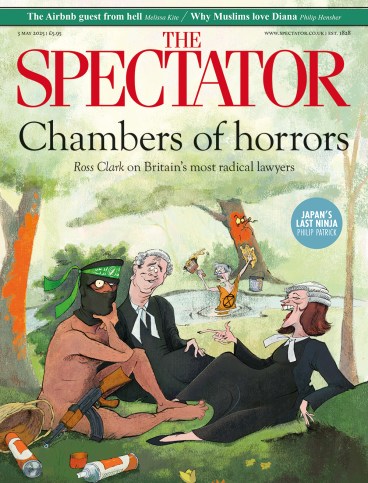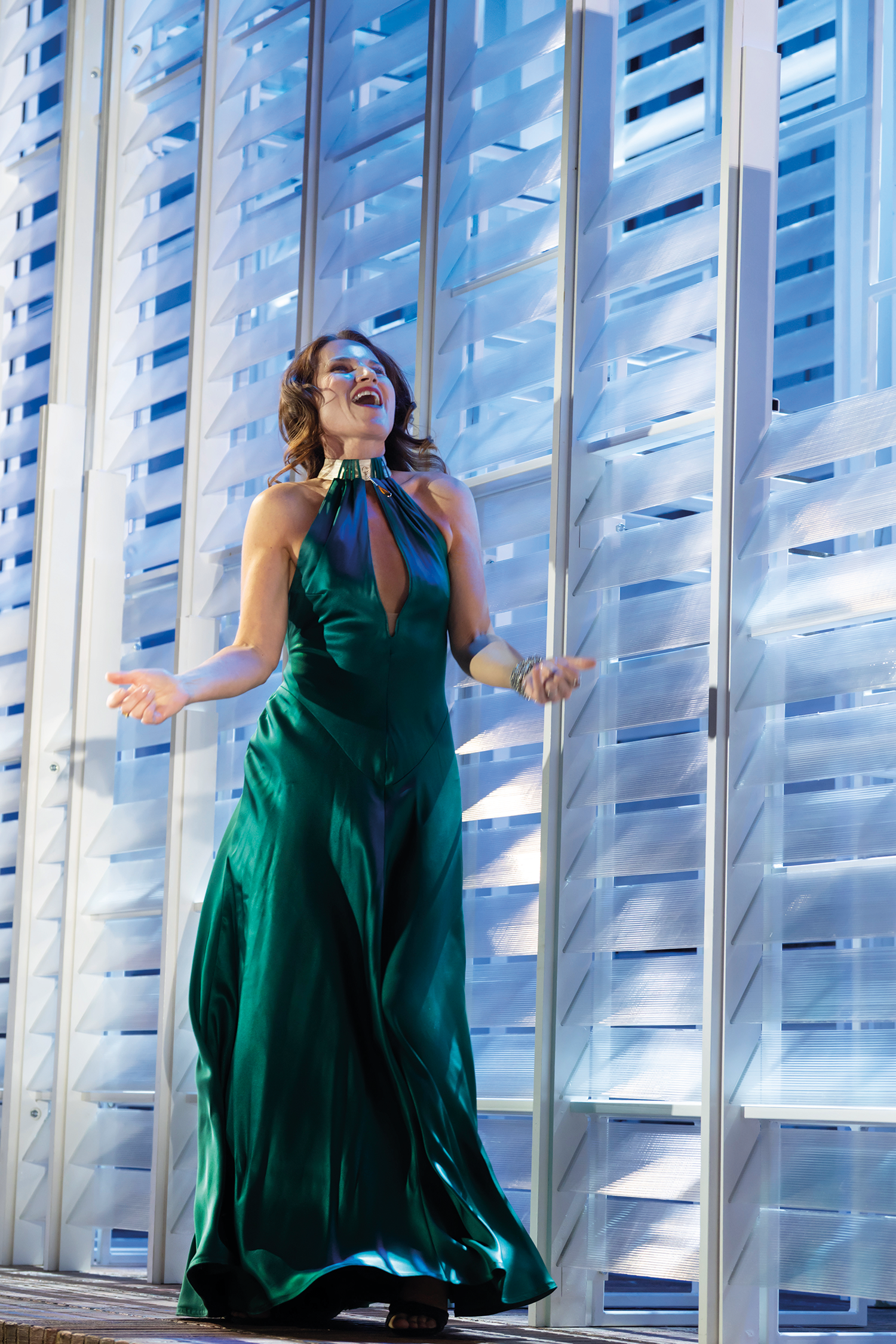
My Master Builder is a new version of Ibsen’s classic with a tweaked title and a transformed storyline. Henry and Elena Solness are a British power couple living in the Hamptons whose relationship is in meltdown after the accidental death of their son. Elena has scrambled to reach the top of the publishing world but she feels bitter that Henry’s career as an architect came to him so easily. When their marriage went awry, she played the field, seducing both men and women, and now she lusts after Henry’s protegé, Ragnar, a camp young stud who may be bisexual. Ragnar is almost too complicated to understand. He’s a philandering black Norwegian with dyed blond hair who speaks English in a Billy Bunter accent that includes flourishes such as ‘crikey!’ and ‘you’re acting like a little nutter,’ and ‘copy that’ (meaning ‘yes’). In dramatic terms, Ragnar is a prize that Elena must possess because her thirst for conquest is boundless.
Henry, meanwhile, has remained faithful to Elena – just about. He pursued an ardent but unconsummated romance with a young journalist, Mathilde, who drafted a novel about their relationship entitled, Master. Here it gets interesting. The manuscript of this explosive work has fallen into the hands of Elena who blackmails Mathilde by offering to publish Master on condition that Henry is revealed as the book’s subject. This will destroy his career.
But does Elena really seek Henry’s ruin? Ibsen’s original story has been entirely abandoned by this point, and the show develops into a saga about a wounded alpha female in pursuit of love, sex and power. Kate Fleetwood sinks her fangs into the role of Elena and sucks out every last drop of blood. The stage crackles with dangerous energy whenever she appears.
Henry, played by the affable Ewan McGregor, feels like an afterthought in his own story. He pads around his luxury home wearing deck shoes and costly linen shirts – like Bing Crosby on a becalmed yacht waiting for the wind to pick up. His interest in Mathilde seems a little half-hearted and their sex scenes lack tension or suspense. He comes across as rather clingy. He begs Mathilde to pledge her love for him while calling himself an old man, ‘withered and battle-scarred’. Self-deprecation is one of his worst habits. He even mocks his new building as ‘a misshapen pyramid’ while making a speech at the official launch party. That can’t have pleased the property developers who paid for his services.
This show is full of puzzles. The set is ‘a kind of inside-out place’, according to the designer Richard Kent whose composition unsettles the eye with too many verticals. His attempts to dress Henry and Ragnar are not entirely successful but he lays on a terrific set of luxury frocks for the female players. At the climax, Henry shares a cathartic, blood-and-guts scene with Elena where all the long-buried truths of their relationship are laid bare. Dramatically, this is pure gold. It’s a long wait but it’s worth it.
Kate Fleetwood sinks her fangs into the role of Elena and sucks out every last drop of blood
Conor McPherson’s latest play is a sprawling family drama set on an Irish farm in the 1980s. All the characters are in love with the wrong people. Elizabeth likes Stephen who likes Lydia who used to like Dermot but doesn’t any more. Dermot likes Freya who likes Brendan who likes Billie who leans on her older brother, Stephen, for protection. This big raggedy circle of misfiring relationships is great fun to watch because the audience can see the full picture while the poor characters themselves are blundering around in the dark. None more so than Uncle Pierre, a priest who claims to be blind and whose legal title to the farm is in dispute. Uncle Vanya is such an obvious influence here that Anton Chekhov deserves to be included in the publicity material. This is a great play for a very simple reason: the characters become your friends instantly. You wonder why the taciturn Stephen keeps ignoring the beautiful Lydia’s importunate glances. You find it outrageous that sparky young Freya wastes her time with the drunken, boorish Dermot. And it breaks your heart to see Billie, who has the brain of an astrophysicist, wasting her time milking cows when she ought to work for Nasa as its chief designer.
In Act Four, the script runs out of control. A dispute over the farm’s ownership leads to a drunken brawl and a confused ending with one character crippled and another claiming to have witnessed a miracle. Chekhov would have redrafted this unnatural scene. But it’s a minor fault. The show will do decent business in London. In New York, it will be a sensation. If your inclination is for Irish melodrama you’ll find this show a lot more entertaining than the festering miserabilism of Brian Friel.









Comments